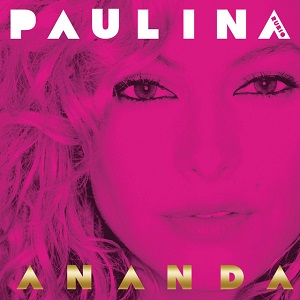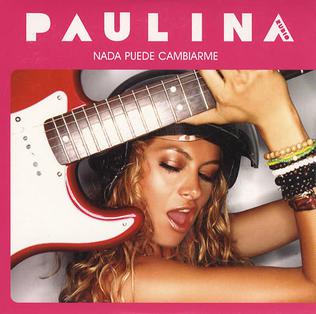
Paulina Susana Rubio Dosamantes is a Mexican singer, songwriter and television personality. Referred to as "The Golden Girl" and "Queen of Latin Pop", she first achieved recognition as a member of the successful pop group Timbiriche from 1982 through 1991. After leaving Timbiriche, she embarked on a solo career. Rubio has sold over 40 million records, making her one of the best-selling Latin music artists of all time.

Ananda is the eighth studio album by Mexican singer-songwriter Paulina Rubio, released on September 18, 2006, through Universal Latino. Its pop rock music incorporates latin, dance, folk, electropop, alternative and flamenco styles with instrumentation from synthpop beats, guitars, drums, synthesizers, strings and Spanish musical instruments. Its themes range from love, empowerment, and dancing. Contributions to the album's production came from a wide range of producers, including Cachorro López, Rick Wake, Tricky Stewart, Áureo Baqueiro, TOY Hernández and Gustavo Santaolalla. Among the songwriters and artist collaborators appear on the album are Xabi San Martín from La Oreja de Van Gogh, Slash from Guns N' Roses, Juanes, Julieta Venegas and Coti.

Pau-Latina is the seventh studio album by Mexican singer Paulina Rubio, released on February 10, 2004, by Universal Latino. Musically, Rubio wanted to make a "futuristic folk" or a "cocktail of different music genres", thus incorporating eclectic latin music in its sound with instrumentation from techno beats, guitars, drums, synthesizers, strings and Spanish guitars musical instruments. Its themes range from love, dancing, friendship and feminist. Contributions to the album's production came from a wide range of producers, including Emilio Estefan, Chris Rodríguez, Toy Hernández, Marcello Acevedo and Sergio George.

Paulina is the fifth studio album by Mexican singer Paulina Rubio. It was released on May 23, 2000 internationally by Universal Music México, being the first one with the label after departing from EMI México. Rubio worked with writers and producers such as Estéfano (mostly), Chris Rodríguez, Armando Manzanero, Juan Gabriel, Christian De Walden, and Richard Daniel Roman. The album explores a more variety sounds much different to the vein of her albums with EMI Music, and has an overall latin pop and dance-pop vibe, with influences from rock, ranchera, bolero, funk and house. Elaborating a "synthesis of the end of the millennium" theme for the album, Rubio reinvented her image.

"Nada Puede Cambiarme" is a song recorded by Mexican singer Paulina Rubio, features electric guitar by Guns N' Roses's Slash. It is the second track on Rubio's eighth studio album, Ananda (2006), which was written by Fernando Montesinos, with production from Áureo Baqueiro. The song was released as second single from Ananda on January 18, 2007 by Universal Latino.

Mexican singer-songwriter Paulina Rubio has released eleven studio albums, fifteen compilation albums, 65 singles, ten promotional singles, and has made some eleven guest appearances. In 1992, Rubio signed a recording contract with record label Capitol Latin in order to launch her career as a solo artist, after recording ten albums with Timbiriche between 1982 and 1990.

"Don't Say Goodbye" is a song by Mexican singer Paulina Rubio, taken from her sixth studio album and crossover album, Border Girl (2002). It was written by Joshua "Gen" Rubin and Cheryl Yie and produced by Rubin. "Don't Say Goodbye" is a dance-pop song and talks about rejecting the idea of not saying goodbye to a lover. The song was released through Universal Records on 29 April 2002 as the lead single from the album. In Latin America and France, a Spanish version of the song titled "Si Tú Te Vas" was released, written by Luis Gómez Escolar.

"The One You Love" is a song by Mexican singer Paulina Rubio from her sixth studio album, Border Girl (2002). It was written by Brett James and Troy Verges, and produced by Shep Goodman and Kenny Gioia. The song was released as the third US and second international single from Border Girl on August 20, 2002, by Universal Records. A Spanish version titled "Todo Mi Amor", was also recorded and released to the Latin American market.

"Algo Tienes" is a song recorded by Mexican singer Paulina Rubio for her seventh studio album, Pau-Latina (2004). Written and produced by Chris Rodríguez and Manny Benito, it is a pop and dance track containing a catchy "Pau! Pau!" hook. The song was released by Universal Latino as the second single from the album on May 17, 2004.

"Causa y Efecto" is a song performed by Mexican singer Paulina Rubio. The song was recorded for her ninth studio album Gran City Pop, and was released as the lead single on March 26, 2009. Causa y Efecto became a hit reaching number 1 in the U.S. Billboard Hot Latin Songs and Hot Latin Airplays. Causa y Efecto was produced by Cachorro López and written by Mario Domm and Mónica Vélez. "Causa y Efecto" is Rubio's first number one single in the Billboard Hot Latin Songs since Ni Una Sola Palabra in 2006. "Causa y Efecto" was awarded "Song of the year pop/ballad" by ASCAP.

"Ni Rosas Ni Juguetes" is a song recorded by Mexican recording artist Paulina Rubio for her ninth studio album Gran City Pop (2009). It was written by Claudia Brant, Noel Schajris and Gianmarco Zignago, and produced by Cachorro López. Due to popularity, the song was announced as the second single on July 20, 2009, released official worldwide on August 17, 2009 by Universal Music Latin Entertainment. "Ni Rosas Ni Juguetes" is a Latin pop song with ranchera and hip-hop influences. The song's lyrics discusses Rubio's decision to overcome a relationship and her empowerment.

"El Último Adiós" is a song recorded by Mexican singer Paulina Rubio for her fifth studio album Paulina (2000). It was released as the second single from the album on July 17, 2000 by Universal Latino. Rubio co-wrote and co-produced the track with Estéfano, and was originally conceived it as a ranchera-hip-hop-styled song. Lyrically, its a break-up mood.

"Me Gustas Tanto" is a song recorded by Mexican singer Paulina Rubio for her tenth studio album, Brava! (2011). It was released by Universal Latino as the lead single from the album on September 2, 2011. The track was written by Rubio, Nacho and Andrés Recio, whilst production was handled by RedOne.

"Mi Nuevo Vicio" is a song by Mexican singer Paulina Rubio, featuring Morat, a Colombian band. It was released on 27 January 2015 by Universal Music Spain, and was later included on the track list of her eleventh studio album, Deseo (2018). The song was written by Juan Pablo Isaza, Juan Pablo Villamil, Simón Vargas, Alejandro Posada and Mauricio Rengifo, and produced by Sky Adams, Carlos Paucar and Rengifo. Musically, "Mi Nuevo Vicio" is a departure from her usual latin pop sound, and adapts to Colombian rumba with elements of rock pop. Lyrically, this talks about how genuine feelings develop during a love affair.

"Si Te Vas" is a song by Mexican singer Paulina Rubio. The song was released digitally via the iTunes Store by the Spanish division of Universal Music Group on January 22, 2016 as the second single from Rubio's eleventh studio album "Deseo". A second version of the song was also released in the reggaeton genre featuring Alexis & Fido.

"Desde Esa Noche" is a song recorded by Mexican singer Thalía, featuring Colombian singer Maluma, for her thirteenth studio album, Latina (2016). The song was released as the album's first single on January 29, 2016 through Sony Music Latin. The song was written and produced by Sergio George with María Adelaida Agudelo, Pablo Uribe, Mauricio Rengifo and Maluma. "Desde Esa Noche" is a Latin pop and reggaeton song, with banda and norteño influences, as well as mariachi horns and cumbian accordion. It has received mostly positive reviews and has become a commercial success all over Latin America and the United States, where it peaked at number 16 on the Hot Latin Songs chart and number 4 on the Latin Pop Songs chart, published by Billboard.

Deseo (Desire) is the eleventh studio album by Mexican recording artist Paulina Rubio, released on September 14, 2018 through Universal Music Spain, seven years after its predecessor Brava! (2011). Rubio worked with a multitude of producers and artist on the album, including Mauricio Rengifo, Andrés Torres, Juan Magán, The Julca Brothers, Toy "Selectah" Hernández, Morat, Joey Montana, Nacho, Xabier San Martin from La Oreja de Van Gogh, Alexis & Fido and DCS. It is a pop album characterized by Latin rhythms abound with urban sounds, and lyrical themes of love and female empowerment.
"Desire (Me Tienes Loquita)" is a song by Mexican singer Paulina Rubio and Venezuelan singer Nacho. The song was released to digital retailers and streaming services by the Spanish division of Universal Music Group on May 25, 2018 as the fourt single from Rubio's eleventh studio album "Deseo". The song was written by Paulina Rubio, Mauricio Rengifo, Andrés Torres, Miguel Ignacio Mendoza Donatti "Nacho", with a production by Andrés Torres and Mauricio Rengifo.
"Si Supieran" is a Pop song by Mexican singer Paulina Rubio released to digital retailers and streaming services on September 12, 2019 and was produced by Rubio, making it the first song released independently from her label Universal Music. This is also Rubio's first new single since her 2018's studio album "Deseo". It was written by Rubio herself along with Antonio Cortés “Barullo”, Jesus “Dale Play” Herrera y Oscar Hernández, and produced by Jesus “DalePlay” Herrera.
"Yo Soy" is a song by Mexican singer Paulina Rubio, released by Sony Music Mexico on October 14, 2021. It marks her first song recorded and released by the Sony Music label, after two decades on Universal Music. Rubio wrote the song with Felipe González, Valentina Rico, Omar Koonze, Andy Clay and Andres Castro, who also produced. "Yo Soy" is a Latin pop, ranchera-mariachi-inspired and trap song which features acoustic guitar harks back to Rubio’s Mexican roots. Lyrically, Rubio "manifest" her independent self as a single mom and artist.
















